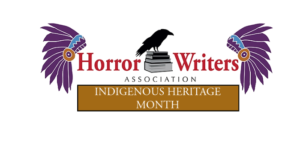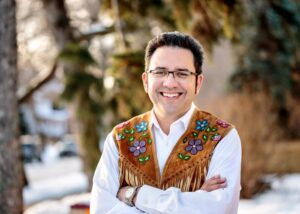Indigenous Heritage in Horror Month: Interview with Richard Van Camp

A recipient of the Order of the Northwest Territories, Richard Van Camp is a proud Tłı̨chǫ Dene from Fort Smith, NWT. He is the author of 28 books in 28 years. Richard is from Fort Smith, Northwest Territories. He is best known for his 1996 novel The Lesser Blessed, which was adapted into a film by director Anita Doron in 2012. You are welcome to visit Richard on Facebook, Instagram, Twitter, Soundcloud and YouTube.

What inspired you to start writing?
Growing up in Fort Smith, NWT, Canada, I was always a reader but I started to realize that I wasn’t seeing anything about us as Northerners in anything that I was reading, so I decided that I wanted to write something that I would like to read. I wanted to show how funny and romantic we were as Northerners and that’s how I wrote my first novel, The Lesser Blessed.
What was it about the horror genre that drew you to it?
I loved Stephen King, Heavy Metal magazine, and scary movies growing up. I also had very cool babysitters who told us the most terrifying stories. I like being that scary babysitter now sharing innocence-ending stories.
Do you make a conscious effort to include indigenous characters and themes in your writing and if so, what do you want to portray?
Yes: I love showing our wisdom and techniques of how to face evil and frickin’ fight it!
What has writing horror taught you about the world and yourself?
You have to cross lines within yourself to write great horror. (Think of the telephone pole scene in Hereditary or “the crossing place” in Brett Easton Ellis’ Imperial Bedrooms. You, unfortunately, need to go that deep and dark to rip us open and haunt us forever.)
How have you seen the horror genre change over the years? And how do you think it will continue to evolve?
I’m terrified by spiritual horror. There’s tonnes in Taaqtumi (Inhabit Media). I think there will be more Indigenous spiritual horror published in the world and way more splatterpunk.
How do you feel the Indigenous community has been represented thus far in the genre and what hopes do you have for representation in the genre going forward?
I think the new anthology, Never Whistle At Night (PenguinRandomHouse) edited by Shane Hawk and Theodore Van Alst is a great example of Indigenous horror excellence. It’s Indigenous edited, written, and the audiobook is Indigenous voice actors only. We’re so proud of it. This is one of several anthologies out there that are Indigenous horror and I see so many new calls for more writing for Indigenous horror.
Who are some indigenous horror authors you recommend our audience check out?
Check out Never Whistle At Night. Check out Taaqtumi (Inhabit Media). Check out Francine Cunningham. Check out The Moon of Crusted Snow by Waubgeshig Rice. Check out Eden Robinson’s Trickster series. Check out The Other Ones by Jamesie Fournier. Check out my writing. Check out The Night Wanderer by Drew Haydon Taylor.
What is one piece of advice you would give horror authors today?
Say goodbye to being nice. Go for the throat.
And to the Indigenous writers out there who are just getting started, what advice would you give them?
Tell your truth. Don’t you dare hold back. (We’ll know if you’re pulling your punches and cheaping out so don’t be cheap to yourself and go for it, Cousin. We’re rooting for you. The world deserves your truth!)
Mahsi cho!



